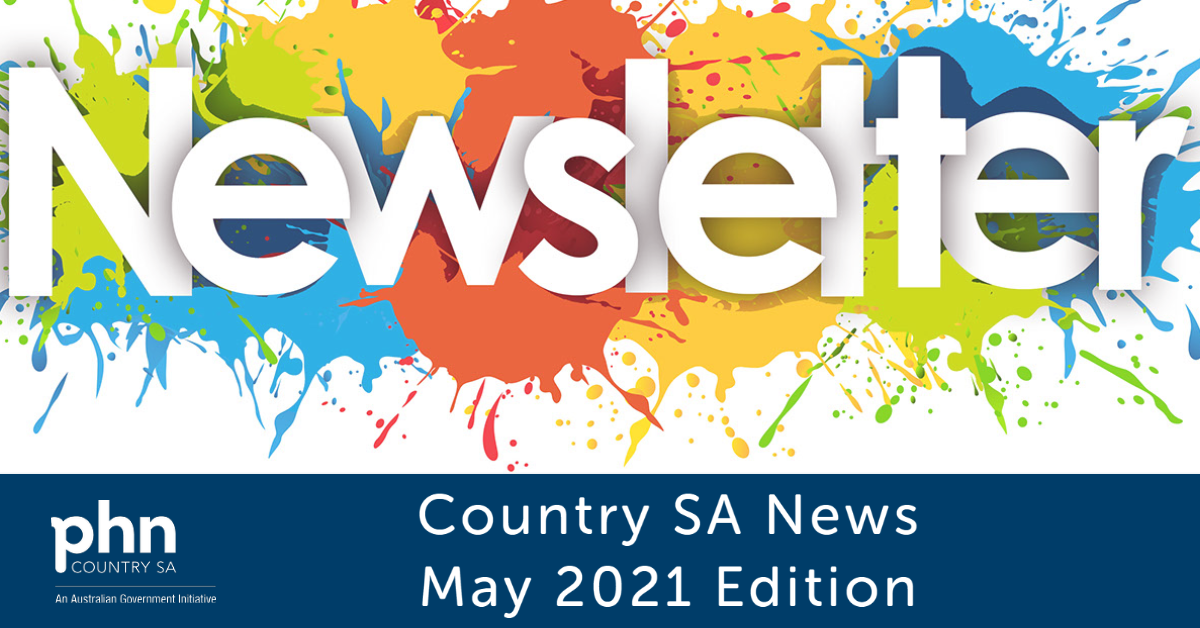View full newsletter here
Message from the CEO
National Suicide Prevention Trial - Aboriginal Aftercare Service
As I watched the Federal Government’s Budget announcement on the night of Tuesday May 11, I was extremely pleased to see the inclusion of comparable funding for the continuation of work in the National Suicide Prevention Trial (NSPT) sites for 2021-22 – including activities within country South Australia. This is due recognition of the success of NSPT activities, the value of their contribution and the importance of their continuation.
As one of the 12 trial sites Country SA PHN (CSAPHN) has been conducting activity under the NSPT since 2017 – bringing significant services to areas of need throughout South Australia’s Country North region – including Whyalla, Port Augusta, Port Pirie, Port Lincoln and Yorke Peninsula. Originally scheduled to end in June 2020, then extended to June 2021, this year’s Budget announcement provides security for continuity of service delivery for priority populations.
At the start of the trial, CSAPHN engaged with the Port Augusta Aboriginal community to co-design a ground-breaking Australian first - the Aboriginal Aftercare Service – providing follow up care from an Aboriginal healthcare worker for Aboriginal people leaving hospital following a suicide attempt. CSAPHN commissioned Pika Wiya Health Service Aboriginal Corporation to deliver this Service, launching in July 2019.
Overarching fundamental elements of the Aftercare Service have included: being provided by an Aboriginal Community Controlled Health Service Organisation; acknowledging language and culture; responding quickly to new referrals and comprehensive engagement with clients. Other examples of good practice have included co-location with the Social and Emotional Wellbeing Team, multiple service pathways, flexible entry and re-entry, inclusion of kinships and consideration of traditional healing, provision of psychosocial models of care and assistance with practical issues such as housing and vocation.
The Aftercare Service also produced guidelines for hospital and health workers - offering a comprehensive approach to maintaining contact after discharge with psychosocial, clinical, and healing approaches and a strong focus on family and community.
As this work was evidence informing, CSAPHN commissioned the University of South Australia’s Department of Rural Health to evaluate the Aftercare Service. Completed in December 2020, the evaluation showed that clients reported better engagement with services, improvements in medication adherence and improved physical and mental health and wellbeing as a result. Click here to view the evaluation.
Overall, the evaluation indicated family and community elder satisfaction was high with many saying they would recommend the Service to others. The data showed that in addition to providing culturally safe care for Aboriginal people recovering from a suicide attempt the Service was used as a bridge to connect clients to other essential services. It was also noted that the Aftercare Service was performing an advocacy role - connecting and re-connecting clients with essential services, problem-solving and negotiating support on their behalf. This suggested that the Aboriginal Aftercare Service prepared clients to respond to future crisis and to transition to other services – bridging a service delivery gap for Aboriginal people in Port Augusta.
In conclusion, the Aboriginal Aftercare Service is widely perceived as being responsive, culturally appropriate and consistent with best practice in suicide prevention in Aboriginal settings. The evaluation stated at the time that ‘to the best of our knowledge there have not been any deaths due to suicide for clients of the service during the time we conducted the evaluation. Similarly, the Port Augusta Emergency Department reported presentations for attempted suicide reduced for clients of the Service.’ The Service is working with established programs, including the National Indigenous Critical Response Service and Beyond Blue’s, The Way Back. It has been recognised as a promising program by the Centre of Best Practice in Aboriginal and Torres Strait Islander Suicide Prevention.
The Aboriginal Aftercare Service has proven to be a wonderful example of the positive impact a culturally appropriate, co-designed and locally driven service provided by an Aboriginal Health Service can provide to the Aboriginal community. I am very pleased to see that the Federal Government has recognised this Service’s effectiveness and we anticipate this will be reflected accordingly in detailed budget allocations.
I commend all those who have contributed to the Aboriginal Aftercare Service and other NSPT activity. We look forward to working with the Commonwealth Department of Health and stakeholders on the implementation of this Budget commitment.
Note: We would like to acknowledge the Black Dog Institute’s document, The National Suicide Prevention Trial: Insights and Impacts in the writing of this foreword.

